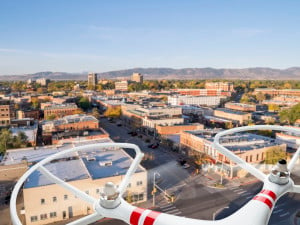By Drew M. Smith
 Recently, I wrote about issues associated with the commercial use of drones. The issue of regulation, registration and control of this technology has become a forefront of legislative discussion. The Federal Aviation Administration (FAA) recently issued new regulations regarding the sale, regulation and use of drones in the U.S in response to the increase in drone incidents and the overall use of drones. In the past year, the FAA issued more and more exceptions for drone operators and this author previously commented on the proposed legislation that the FAA was bringing to its table. With their recent actions, the FAA has taken steps to further regulate the sale and the operation of drones in the U.S.
Recently, I wrote about issues associated with the commercial use of drones. The issue of regulation, registration and control of this technology has become a forefront of legislative discussion. The Federal Aviation Administration (FAA) recently issued new regulations regarding the sale, regulation and use of drones in the U.S in response to the increase in drone incidents and the overall use of drones. In the past year, the FAA issued more and more exceptions for drone operators and this author previously commented on the proposed legislation that the FAA was bringing to its table. With their recent actions, the FAA has taken steps to further regulate the sale and the operation of drones in the U.S.
Beginning on December 21, 2015, the FAA mandates that all drones weighting more than .55 ounces that are purchased by so-called hobbyists, be registered with the FAA. For those that purchased one for commercial means, they now have until February 19th to register them with the FAA. The administration is also working on apps that would allow buyers to instantly scan and register it with the database. This is immensely helpful considering the amount of registrations. In the first couple of weeks of the program, 181,061 drones were registered. Many are expecting over 2.6 Million drones sold in 2016,with over a million above that magical .55 ounce threshold. Considering that an estimated 400,000 drones were bought for the holidays, this registration is a big deal.1
The registration of these drones is simple and the rules for registration are as well. You need to be 13 years of age or older and a U.S Citizen or legal permanent resident. Anything between .55 ounces and 55 pounds can be registered online, (http://www.faa.gov/uas/registration/)2 but anything heavier needs to be registered manually. It only costs $5 and if the operators sign up before January 20th that fee can be waived. However, there are some people who are not so keen of the weight restrictions, in particular, the ones that are towards the smaller end of the scale. The restrictions apply to all drones even the smaller ones that are not expected to impede anything, like the 3D Robotics' Iris+ and DJI's Inspire which are lighter than the ones used by companies like Boeing.3
The penalties for failure to register a drone are extremely harsh. If your drone is involved in an incident, such as, inadvertently causing a car crash and it is not registered, then civil fines can run up to $27,500. Criminal fines can be worse as they can reach up to $250,000 and up to a 3 years jail sentence, regardless of what other penalties are assessed. There are some grumblings that these restrictions are too harsh. Henri Seydoux, the Chief Executive Officer of French drone company Parrot who attended the Consumer Electronic Show recently, said he doesn’t think the U.S. approach is particularly onerous. “In the end, I don’t believe regulations will be all that different in other countries,” he said.
For commercial use, the regulations are much more serious. The commercial use of a drone is considered commercial aviation thus regulated by the FAA. As with anything related to commercial aviation, specific rules must be followed. The operator must have a valid pilot’s license and a separate spotter must be used. The operators must be within a hundred feet of it and within eyesight of the drone while in use. In addition, they must notify any nearby airport if they are flying with 5 miles of an airfield, military base, or selected national parks.4 The observer must also have training in first aid in case something goes wrong.
Two of the biggest issues concerning drones are privacy and safety. Manned drones can be used to potentially spy on other people and other private property. In one case in Kentucky, a man was arrested for shooting down a drone spying on his daughter.5 Because of the flight restrictions, these drones can also impede EMS services if not used properly, such as in California where drones forced helicopters to stay on ground and as a result.6
The use of drones is only going to continue to rise and users should be increasingly aware of the regulations and requirements. Keep looking for our posts as more news develops on this new technology.
1http://www.insurancejournal.com/news/national/2016/01/07/394353.htm
2http://www.faa.gov/uas/registration/
3http://www.engadget.com/2014/11/24/faa-drone-rules-would-require-license/
4https://www.mapbox.com/drone/no-fly/
5http://www.hngn.com/articles/114839/20150731/kentucky-man-arrested-shooting-down-1-800-drone-hovering-over.htm
6http://uproxx.com/technology/2015/07/drones-california-wildfire/

